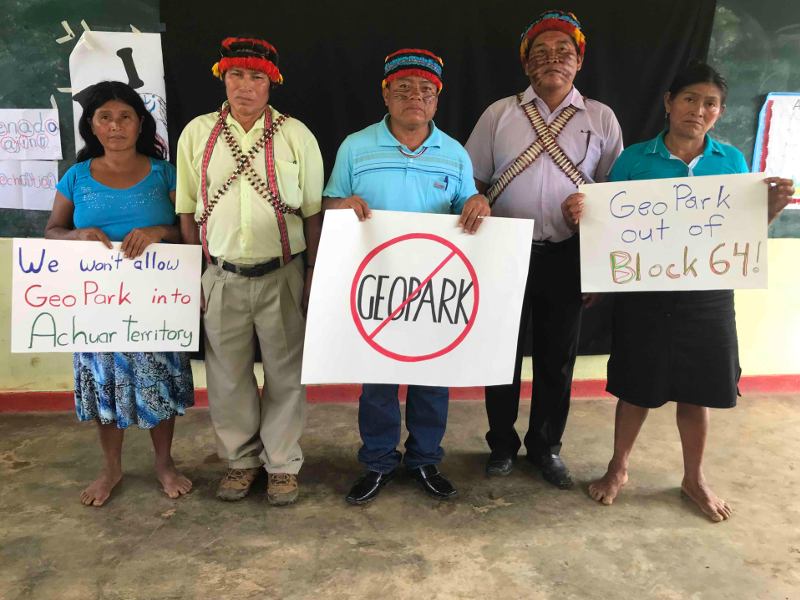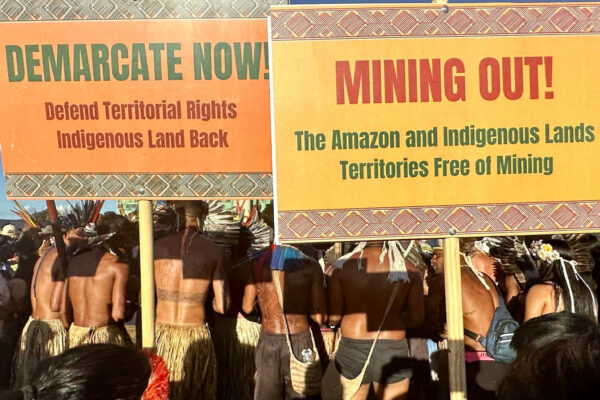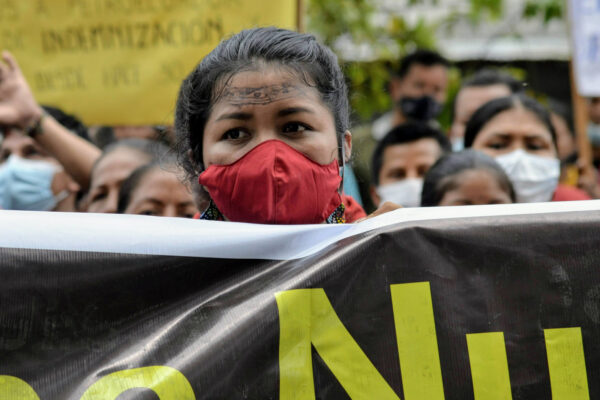San Lorenzo, Peru – A federation of indigenous communities deep in the Peruvian Amazon rainforest affirmed its rejection of planned oil operations in its ancestral territory ahead of Friday’s annual shareholder meeting of GeoPark (GPRK). The Chile-based oil company currently holds a license to explore in Peru’s Block 64, which overlaps a significant part of Achuar ancestral territory in the Pastaza River Basin. The federation, known as FENAP, also accuses GeoPark of fomenting conflict among indigenous communities in the area.
In addition to multiple public statements since December 2016 when the Peruvian government approved GeoPark’s plans for oil operations in Block 64, the Achuar of the Pastaza River Basin reiterate in a new video, released this week by Amazon Watch, their continued rejection of oil operations in their ancestral territory. In the video representatives from dozens of Achuar communities are shown mobilizing in opposition to GeoPark, underscoring the words of FENAP President Jeremías Petsein who states, “United, we categorically reject GeoPark.”
The video launch comes on the heels of a July 20th court hearing in Iquitos, Peru, during which FENAP renewed its request for the courts to annul Block 64 for having been created in 1995 without consultation or the consent of the Achuar communities there. The lawsuit represents a clear and present legal risk for GeoPark, especially in light of a court-ordered cancelation in 2017 of contracts for Block 116, held by Maurel Et Prom (France) and Pacific (Canada), on similar grounds.
GeoPark announced, in its Second Quarter 2018 Operational Update, that it had “completed the [environmental impact statement] to initiate operations in the Situche Central oil field in the Morona block,” and affirmed that it had submitted the document to the National Environmental Certification Service on July 2, 2018, “after more than a year of collecting data, and in which local communities were also involved.”
However, GeoPark has failed to acknowledge FENAP’s opposition, as well as the history of failed oil operations in Block 64 (referred to by GeoPark as the “Morona Block”). In fact, three oil companies – Talisman, Occidental, and ARCO – have all tried and failed to initiate operations in Block 64 in years past, due in no small part to Achuar opposition.
GeoPark also fails to acknowledge that the production wells within the Situche Central field are located in highly contested territory, claimed both by a small handful of pro-oil Achuar communities and a majority of Achuar communities within the oil block, who are vehemently opposed to oil operations.
Such conflict has previously been fomented by oil companies, as in 2009 when Talisman Energy, which at that point held the contract for Block 64, helicoptered in Achuar men armed with shotguns to confront Achuar families of FENAP who had marched to Situche Central to protest oil operations. Talisman was charged in 2014 by Peru’s Public Ministry with “attempted genocide” for provoking a standoff that almost led to physical violence between Achuar brethren. In a recent communique, FENAP claimed that GeoPark is using similar strategies to attempt to divide and conquer Achuar communities.
Block 64, located in the northern Peruvian Amazon close to the border with Ecuador, was created in 1995. Since that time, various international oil companies have acquired the concession, all of which eventually abandoned operations. The most recent departure was Talisman, which announced its departure in September 2012, followed by the transfer in early 2013 to state-owned company PetroPeru. Geopark acquired the concession in October 2014 and received governmental approval to proceed with exploration activities in December 2016.
Companies like GeoPark would not have the capital to carry out operations like the one in Block 64 were it not for financing from U.S.-based financial institutions like JPMorgan Chase and BlackRock. Amazon Watch research documented that these institutions have substantial holdings in GeoPark and other oil companies attempting to drill for oil in the Amazon rainforest, and explained the significant climate, indigenous rights, and financial risks of this financing.
Quotes
“On multiple occasions including the General Assembly of FENAP we have said no to the oil company Geopark. We have seen all of the negative consequences like contamination that are brought when an oil company enters indigenous territory. In the name of FENAP, I emphatically reject the entry of GeoPark into our territory.”Jeremías Petsein Peas, President of FENAP (Peruvian Federation of Achuar Nationality, comprised of 45 Achuar communities living in the Pastaza River Basin)
“GeoPark is misleading its shareholders and investors about the contentious situation it faces in Peru’s Block 64. Investors should anticipate GeoPark’s activities in Achuar territory will be a liability, fraught with reputational, financial, and legal risks. Larger, more sophisticated companies were unable to get very far; why does GeoPark think it will be successful?”Andrew Miller, Advocacy Director, Amazon Watch














